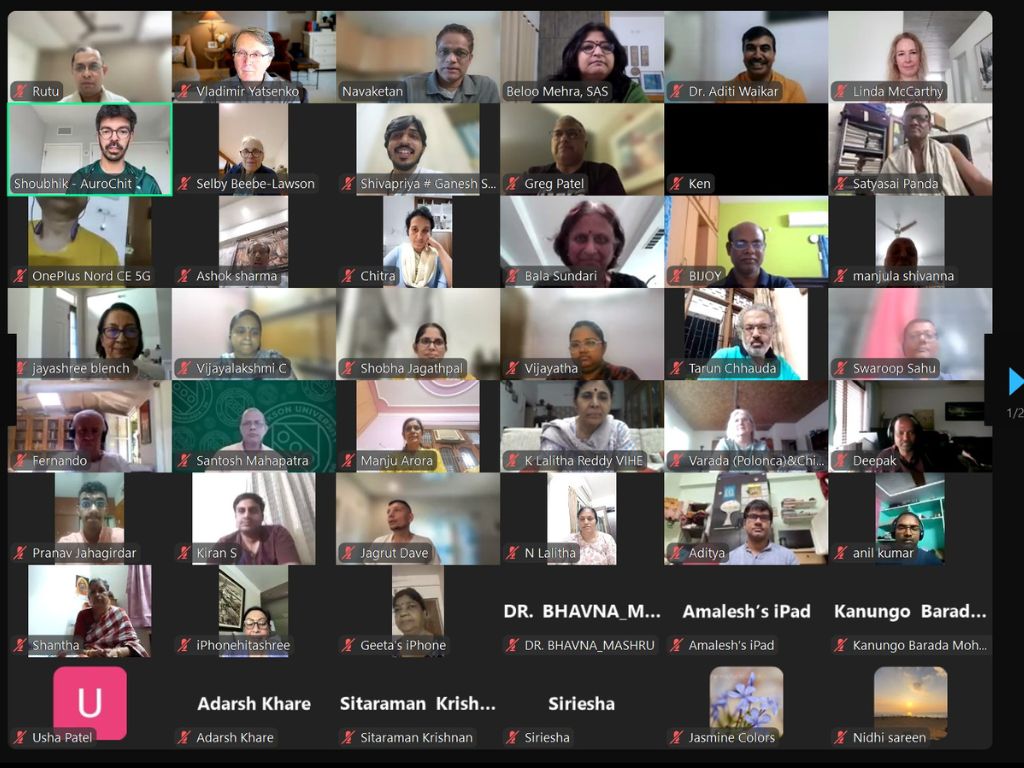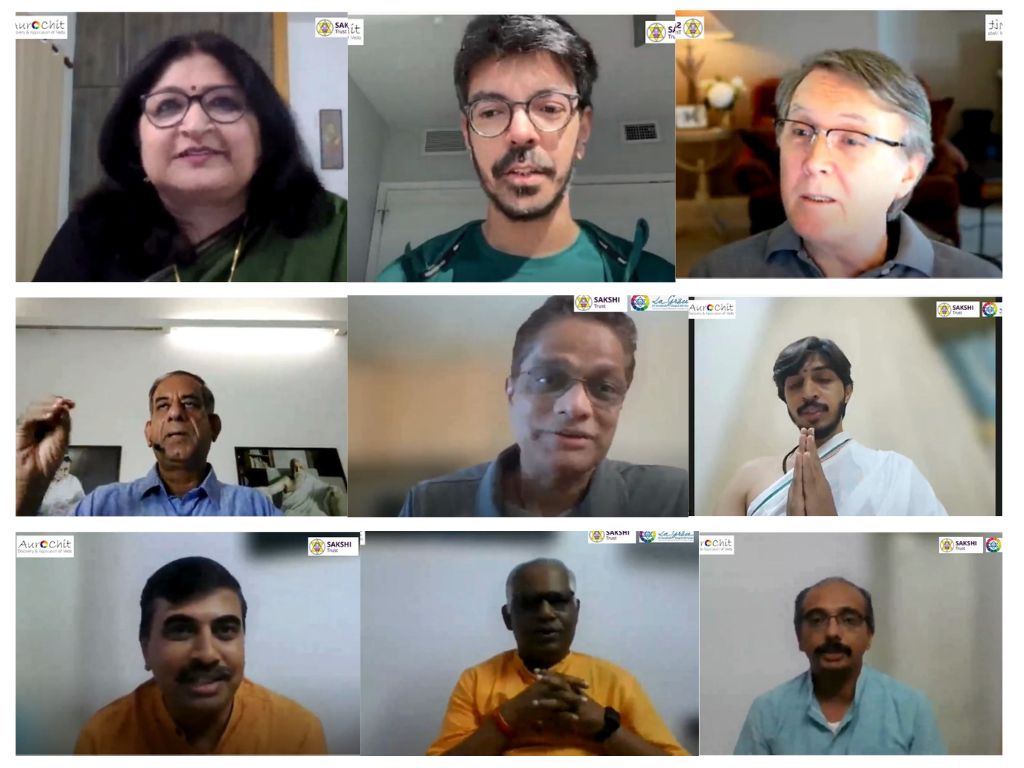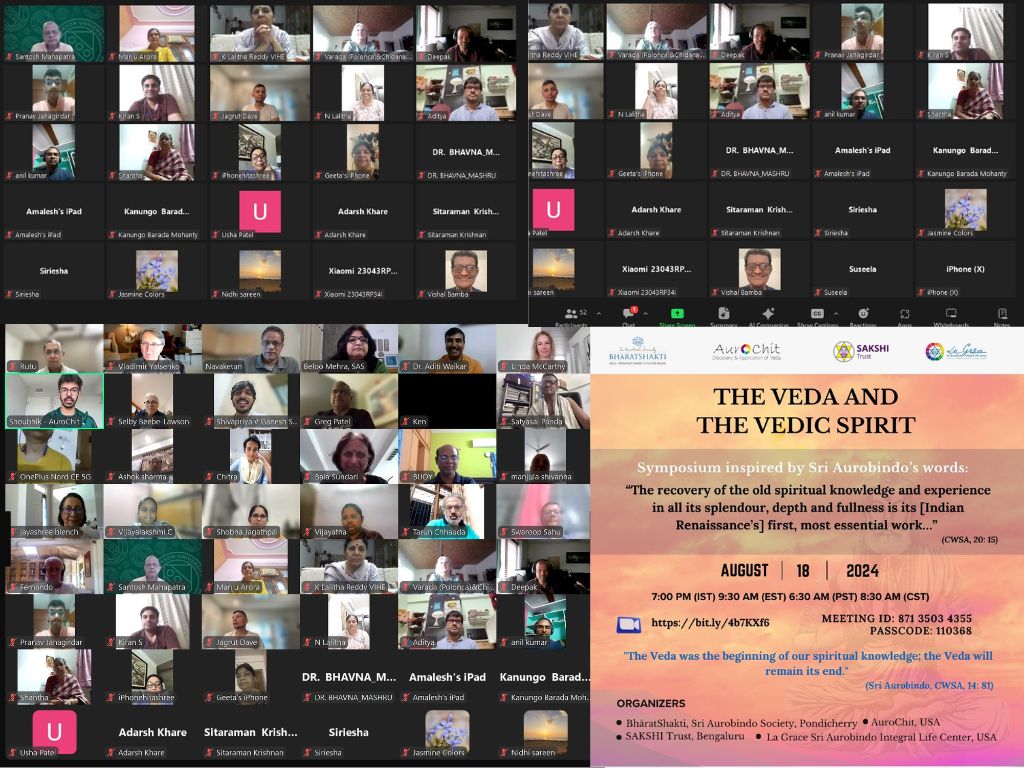Date: August 18, 2024
WATCH the recordings of the 2.5-hour-long symposium:
PART 1, PART 2, PART 3
“The recovery of the old spiritual knowledge and experience in all its splendour, depth and fullness is its [Indian Renaissance’s] first, most important work…”
(Sri Aurobindo, CWSA, 20: 15)
As part of our ongoing activities of the study group on the Veda, on 18th August, 2024 BhāratShakti organised an online symposium on “The Veda and the Vedic Spirit” to commemorate the 152nd Birth Anniversary of Sri Aurobindo. This symposium was planned in collaboration with our partners for the study group, Sri Aurobindo Kapali Shastry Institute of Vedic Culture (SAKSHI), Bengaluru, AuroChit, USA, and La Grace Sri Aurobindo Integral Life Center, USA.
About 80 participants from various parts of India, USA and Europe joined the online symposium. The programme included two keynote speeches, a brief Vedic chanting session and a panel discussion. The keynote speakers included:
1) Dr. Vladimir Yatsenko, Director, Institute for Applied Research in Integral Studies at La Grace, Sri Aurobindo Integral Life Center, USA. He holds a master’s degree in Linguistics, Sanskrit Language and Literature, and a PhD in Indian Philosophy
2) Dr. Alok Pandey, Sri Aurobindo Ashram, Pondicherry. An authority on the works of Sri Aurobindo and the Mother and with an MD in Psychiatry, Dr Pandey has conducted numerous workshops in India and abroad on yoga, education, health and psychology. He has also authored many books and is also the editor of the All India Magazine of Sri Aurobindo Society.

The symposium began with a welcome address and introductory remarks by Dr Beloo Mehra. She opened her address by saying how perfectly the work happening under the study group and the Veda symposium aligns with the spirit of the governing ideal under which BhāratShakti has been working. She highlighted Sri Aurobindo’s words that the living energy of a great spiritual conception has been the very principle of existence for India, which has also been the perpetual force for her constant renewal and persistence as an immortal nation. And she added that the moment we think of this core foundation of Indian culture, a word that immediately comes to mind is Veda, and that it was Sri Aurobindo who has truly recovered for the humanity the Vedic knowledge and experience in all its splendour, depth and fullness. She then gave a brief outline of the topics that were going to be taken up during the symposium.
Mr. Shoubhik Purkayastha from AuroChit then introduced the first speaker, Dr. Vladimir Yatsenko, who spoke on the subject of the Vedic Vision in the Light of Sri Aurobindo. Dr. Yatsenko explained the principle of seven planes of consciousness as per the Vedic cosmology and highlighted the correspondence with Sri Aurobindo’s terminology. He spoke about the seven sons of Aditi and how they symbolize the planes of consciousness, including Surya who represents the hidden Sun – hidden in darkness which has to be found by the Vedic rishi. He also briefly described how the later terminologies and ideas which we find in the Vedantic texts as well as Bhagavad Gita find their origin in the Veda. And Sri Aurobindo helps us find that key to understand these deeper connections and continuity of the Vedic tradition.

Thereafter, Dr Alok Pandey spoke about “The Powers that are Vedic Devas.” The main thrust of his argument was that the various Vedic gods or devas were essentially cosmic powers. He briefly recalled the story of Creation as the Mother told a few times and through its explanation emphasised that these gods have a real existence and we should not make the mistake of thinking that they are imaginary beings. He also spoke about the hierarchy of the gods which is corresponding to the hierarchy of the planes of consciousness, but each god has a specific assigned function in the cosmos and helps maintain a cosmic order. He briefly summarised the psychological-spiritual functions of some of the Vedic gods such as Varuna, Indra, Agni, Maruts, Ashwins, and gave a few examples of the working of these powers. Both the sessions were followed by some live interaction with the participants who raised some questions.
These sessions were followed by a meditative experience of Vedic Mantra Chanting by Mr. Ganesh Sharma. Mr. Sharma teaches the chanting of Veda mantras under SAKSHI’s Veda Surabhi Program and is also the founder of Nitantara Yoga Shaalaa where he teaches Yoga-sadhana. At the symposium he chanted Ganesha Suktam (Rg Veda, Mandala 8, Suktam 81), Shraddha Suktam (Rg Veda, Mandala 10, Suktam 151), and Medha Suktam (Krishna Yajur Veda).

This beautiful experience was followed by a panel discussion on the topic – “What is meant by the Recovery of the Vedic Spirit and why is it relevant for the future of humanity?”. The discussion was moderated by Dr. Nagendra N. from SAKSHI, who is a Vedic scholar and chief mentor of the ongoing study group ‘Discovery and Application of the Veda‘. The panelists included: Dr. R V Jahagirdar, Managing Trustee of of Sri Aurobindo Kapali Sastry Institute of Vedic Culture (SAKSHI), Bangalore, directing research in the Vedas, publication of books, planning and conducting workshops on the Vedas etc., and Dr. Yogesh Waikar who is the author of 2-volume book, Yoga Mudra which is a collection of short self revelatory review and notes on Veda Samhita, Brahmana, Aranyaka, Mimamsa and Upanishads.
The closing remarks were made by Mr. Navaketan Mohanty from AuroChit. He thanked all the participants and speakers and reiterated the significance of studying Vedic insights in the light of Sri Aurobindo. Mr. Shoubhik Purkayastha briefly informed the participants about the online study group. The programme concluded with an expression of gratitude all around.
